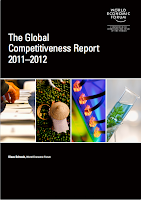For example, in the Global Competitiveness Report for 2011-12, produced by the World Economic Forum, Sweden ranks third, ahead of the United States (fifth) and Canada (twelfth), as the world's most competitive economy. And yet Sweden is the highest taxed country in the world with 54.2 per cent of its GDP going to taxes, compared to only 29.6 for the U.S. and 35.8 for Canada.
 The World Economic Forum is an institution composed of various corporate communities so we can dismiss any suggestions of left-wing bias in the report.
The World Economic Forum is an institution composed of various corporate communities so we can dismiss any suggestions of left-wing bias in the report.The Forum ranks competitiveness on the quality of a nation's institutions; its infrastructure such as roads, ports and electricity supplies; macroeconomic factors such as government budget balances and gross national savings; health and education; goods and labour market efficiencies; technological readiness; market size; business sophistication; and innovation.
Northern and Western European nations, i.e. relatively high tax nations, dominated the top 10 rankings. This makes sense. Countries with good social and physical infrastructure, i.e. countries with well-educated, healthy workforces and good roads, ports and other facilities should be highly competitive economically. And good infrastructure does not come cheap. We might expect, therefore, that to maximize its prosperity, a country must have high taxes—just the opposite of what the corporate message tirelessly tells us.
No comments:
Post a Comment